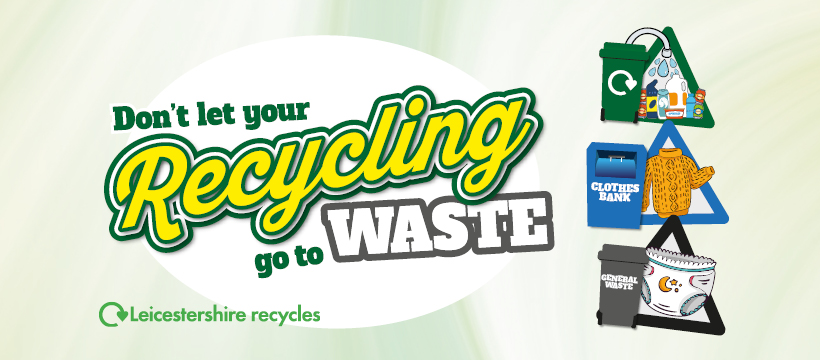Recycle Contamination in Recycling

When it comes to contamination, there are several ways in which items can spoil a load of recycling. It’s not just about putting the wrong thing in the wrong bin, contamination also occurs when unclean objects are mixed with clean recycling. It’s a messy issue, not to mention time-consuming and costly.
Last year, 6,250 tonnes of material had to be disposed of, at a cost of just under £700,000, due to incorrect and dirty items being dumped in Leicestershire’s recycling bins.
Leicestershire’s key contaminants
There are a number of contaminants that have to be removed from Leicestershire’s recycling each week, including nappies, food waste, textiles and batteries and electricals. All of which should never be disposed of in your recycling bin.
Nappies
Up to 4000 nappies have to be removed from Leicestershire’s recycling each day – that’s more than 300 every hour! Not only are they non-recyclable, dirty nappies can spoil any other material they come into contact with and have to be removed by hand once they reach the sorting facility, which is both unpleasant and unhygienic for the person doing the picking.
Nappies should always be thrown out with your general rubbish and never disposed of in your recycling bin.
Food waste
One of the main contaminants that comes through Leicestershire’s recycling stream, is packaging that still contains food and drink. This includes items like dirty margarine tubs, half-eaten pots of yogurt, and liquid left in drinks bottles. Once in your bin, may ruin other materials, like paper and card which cannot be cleaned.
Please remember to empty and rinse your pots, tubs, jars, trays and bottles, and leave them to dry before placing them in your recycling bin. Clean recycling is key to improving the quality and quantity of material we recycle.
Textiles
Whilst clothes and other textiles can be reused, they’re not accepted as part of your mixed kerbside recycling. The reason for this is they could become wrapped around the sorting facility equipment, causing extensive and costly damage or, due to mixed recycling collections, textiles could be contaminated by unidentifiable liquids and broken glass, which is impossible to remove.
We’d recommend selling them, donating them or dropping them off at a charity shop, clothing bank or your nearest Recycling and Household Waste Site |Leicestershire County Council. Your local council may also provide a separate clothing collection, so make sure to check with them.
Batteries and Electricals
- Always recycle batteries and electrical items separately from other types of waste
- You’ll find suitable recycling points near you on the Recycle Your Electricals website.
- You can recycle your batteries and electrical items at Recycling and Household Waste Sites across Leicestershire
- Residents of North West Leicestershire can recycle batteries and mobile phones as part of the kerbside recycling collection. Information correct as of 1st August 2024. More information can be found on the North West Leicestershire District Council website.
- Residents of Melton can recycle household batteries and small electrical items alongside kerbside recycling collections. Information correct as of 1st August 2024. More information can be found on the Melton Borough Council website.
- Residents of Blaby can recycle household, mobile phone, hearing aid and lithium batteries as part of their kerbside recycling collection. Information correct as of 1st August 2024. More information can be found on the Blaby District Council Website.
Find out more in our batteries and electrical items page.
What can residents do to help?
As a county resident, it is your responsibility to make sure that the right things are going in the right bins. We know it can be confusing, so we’ve put together our top tips to help you get the most out of your recycling:
- Recycling should be clean and dry, so make sure to empty food and drink containers, give them a quick rinse and then leave to drain before recycling.
- Put lids back on to jars and bottles before putting them in your recycling bin.
- Don’t forget to recycle items from all rooms in the house – cleaning product bottles, toilet roll tubes and kitchen foil.
If you’re unsure what you can and can’t recycle in Leicestershire, take a look at our list of items accepted at Casepak.
Also in Recycle Sub menu










